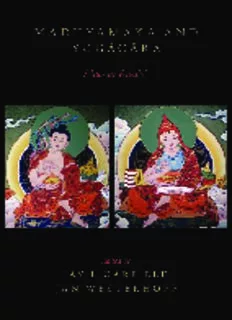
Madhyamaka and Yogacara: Allies or Rivals? PDF
Preview Madhyamaka and Yogacara: Allies or Rivals?
Madhyamaka and Yogaˉcaˉra Madhyamaka and Yogaˉcaˉra Allies or Rivals? z Edited by JAY L. GARFIELD AND JAN WESTERHOFF 1 1 Oxford University Press is a department of the University of Oxford. It furthers the University’s objective of excellence in research, scholarship, and education by publishing worldwide. Oxford New York Auckland Cape Town Dar es Salaam Hong Kong Karachi Kuala Lumpur Madrid Melbourne Mexico City Nairobi New Delhi Shanghai Taipei Toronto With offices in Argentina Austria Brazil Chile Czech Republic France Greece Guatemala Hungary Italy Japan Poland Portugal Singapore South Korea Switzerland Thailand Turkey Ukraine Vietnam Oxford is a registered trade mark of Oxford University Press in the UK and certain other countries. Published in the United States of America by Oxford University Press 198 Madison Avenue, New York, NY 10016 © Oxford University Press 2015 All rights reserved. No part of this publication may be reproduced, stored in a retrieval system, or transmitted, in any form or by any means, without the prior permission in writing of Oxford University Press, or as expressly permitted by law, by license, or under terms agreed with the appropriate reproduction rights organization. Inquiries concerning reproduction outside the scope of the above should be sent to the Rights Department, Oxford University Press, at the address above. You must not circulate this work in any other form and you must impose this same condition on any acquirer. Library of Congress Cataloging-in-Publication Data Madhyamaka and Yogacara : allies or rivals? / edited by Jay L. Garfield, Jan Westerhoff. p. cm. ISBN 978–0–19–023128–6 (hardback) — ISBN 978–0–19–023129–3 (paperback) 1. Buddhist philosophy. 2. Madhyamika (Buddhism) 3. Yogacara (Buddhism) I. Garfield, Jay L., 1955– editor of compilation. II. Westerhoff, Jan, editor of compilation. B162.M33 2015 294.3’42042—dc23 2014028326 1 3 5 7 9 8 6 4 2 Printed in the United States of America on acid-free paper Contents Acknowledgments vii Contributors ix Introduction: Madhyamaka and Yogācāra: Allies or Rivals? —jay l. garfield and jan westerhoff 1 1. P ratītyasamutpāda and Dharmadhātu in Early Mahāyāna Buddhism—chaisit suwanvarangkul 11 2. Language and Existence in Madhyamaka and Yogācāra: Preliminary Reflections—mattia salvini 29 3. Reification and Nihilism: The Three-Nature Theory and Its Implications—sonam thakchöe 72 4. The Case for Discontinuity—mark siderits 111 5. “Undigested Pride”: Bhāviveka on the Dispute between Madhyamaka and Yogācāra—malcolm david eckel 127 6. Xuanzang and Kuiji on Madhyamaka—dan lusthaus 138 7. Nāgārjuna’s Yogācāra—jan westerhoff 165 8. Nāgārjuna the Yogācārin? Vasubandhu the Mādhyamika? On the Middle-way between Realism and AntiRealism —eviatar shulman 184 9. Without Karma and Nirvāṇa, Buddhism Is Nihilism: The Yogācāra Contribution to the Doctrine of Emptiness—jonathan c. gold 213 vi Contents 10. Two Topics Concerning Consciousness in Śāntarakṣita’s Yogācāra-Madhyamaka Syncretism—james blumenthal 242 11. I Am a Brain in a Vat (Or Perhaps a Pile of Sticks by the Side of the Road)—jay l. garfield 252 Index 275 Acknowledgments Jay L. Garfield gratefully acknowledges support from the John Templeton Foundation and the Australian Research Council, as well as research grants from Smith College and Yale-NUS College. Jan Westerhoff gratefully acknowledges the support from the entire net- work of causes and conditions that made the publication of this volume possible. Contributors James Blumenthal an Associate Professor of Philosophy at Oregon State University and Professor of Buddhist Studies at Maitripa College. He is the author of The Ornament of the Middle Way: A Study of the Madhya- maka Thought of Śāntarakṣita (2004) and coauthor with Geshe Lhund- up Sopa of Steps on the Path: A Commentary on the “Samatha” Chapter of Tsongkhapa’s Lamrim Chenmo (2014). In addition, he dozens of ar- ticles in scholarly venues and popular periodicals on various aspects of Buddhist thought and practice. Malcolm David Eckel is Professor of Religion at Boston University, where he has received the Metcalf Award for Teaching Excellence and has been recognized as Distinguished Teaching Professor of the Humani- ties. At Boston University he has served as Director of the Institute for Philosophy and Religion and as Director of the Core Curriculum. Before joining Boston University, he served as Associate Professor and Administrative Director of the Center for the Study of World Religions at Harvard Divinity School. His publications include Bhaviveka and His Buddhist Opponents; Buddhism: Origins, Beliefs, Practices, Holy Texts, Sacred Places; To See the Buddha: A Philosopher’s Quest for the Meaning of Emptiness; Jnanagarbha’s Commentary on the Distinction Between the Two Truths: An Eighth-Century Handbook of Madhyamaka Philosophy; and “Is There a Buddhist Philosophy of Nature?” in Theoretical and Methodological Issues in Buddhism and Ecology. Jay L. Garfield is Kwan Im Thong Hood Cho Temple Professor of Hu- manities and Head of Studies in Philosophy at Yale-NUS College, Pro- fessor of Philosophy at the National University of Singapore, Recur- rent Visiting Professor of Philosophy at Yale University, Doris Silbert Professor in the Humanities and Professor of Philosophy at Smith Col- lege, Professor of Philosophy at Melbourne University, and Adjunct Professor of Philosophy at the Central University of Tibetan Studies.
Description: